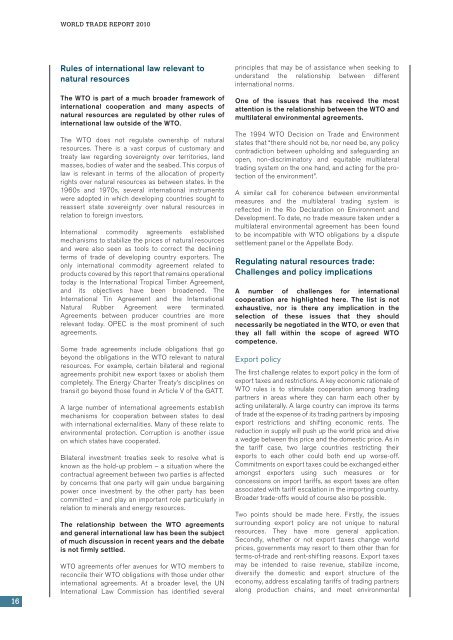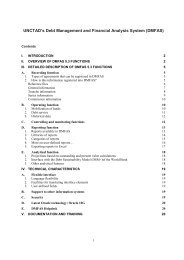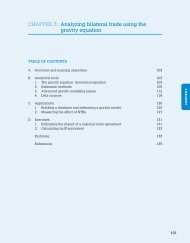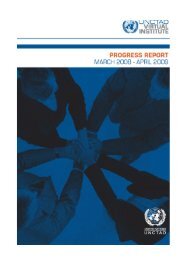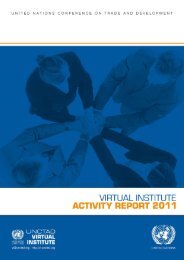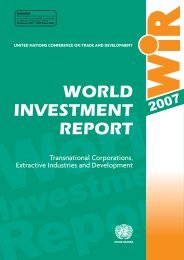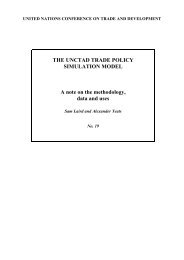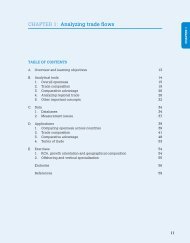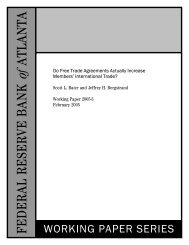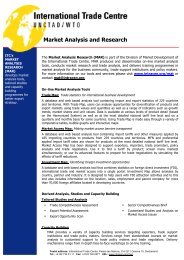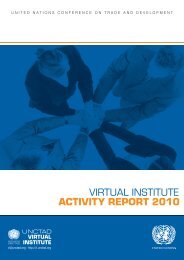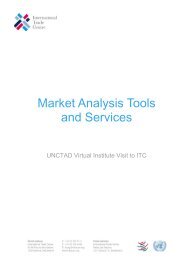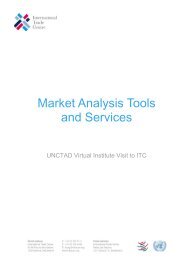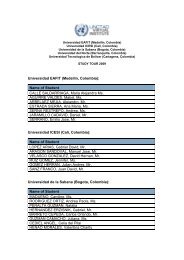WTO: World Trade Report 2010 - World Trade Organization
WTO: World Trade Report 2010 - World Trade Organization
WTO: World Trade Report 2010 - World Trade Organization
Create successful ePaper yourself
Turn your PDF publications into a flip-book with our unique Google optimized e-Paper software.
world trade report <strong>2010</strong><br />
16<br />
Rules of international law relevant to<br />
natural resources<br />
The <strong>WTO</strong> is part of a much broader framework of<br />
international cooperation and many aspects of<br />
natural resources are regulated by other rules of<br />
international law outside of the <strong>WTO</strong>.<br />
The <strong>WTO</strong> does not regulate ownership of natural<br />
resources. There is a vast corpus of customary and<br />
treaty law regarding sovereignty over territories, land<br />
masses, bodies of water and the seabed. This corpus of<br />
law is relevant in terms of the allocation of property<br />
rights over natural resources as between states. In the<br />
1960s and 1970s, several international instruments<br />
were adopted in which developing countries sought to<br />
reassert state sovereignty over natural resources in<br />
relation to foreign investors.<br />
International commodity agreements established<br />
mechanisms to stabilize the prices of natural resources<br />
and were also seen as tools to correct the declining<br />
terms of trade of developing country exporters. The<br />
only international commodity agreement related to<br />
products covered by this report that remains operational<br />
today is the International Tropical Timber Agreement,<br />
and its objectives have been broadened. The<br />
International Tin Agreement and the International<br />
Natural Rubber Agreement were terminated.<br />
Agreements between producer countries are more<br />
relevant today. OPEC is the most prominent of such<br />
agreements.<br />
Some trade agreements include obligations that go<br />
beyond the obligations in the <strong>WTO</strong> relevant to natural<br />
resources. For example, certain bilateral and regional<br />
agreements prohibit new export taxes or abolish them<br />
completely. The Energy Charter Treaty’s disciplines on<br />
transit go beyond those found in Article V of the GATT.<br />
A large number of international agreements establish<br />
mechanisms for cooperation between states to deal<br />
with international externalities. Many of these relate to<br />
environmental protection. Corruption is another issue<br />
on which states have cooperated.<br />
Bilateral investment treaties seek to resolve what is<br />
known as the hold-up problem – a situation where the<br />
contractual agreement between two parties is affected<br />
by concerns that one party will gain undue bargaining<br />
power once investment by the other party has been<br />
committed – and play an important role particularly in<br />
relation to minerals and energy resources.<br />
The relationship between the <strong>WTO</strong> agreements<br />
and general international law has been the subject<br />
of much discussion in recent years and the debate<br />
is not firmly settled.<br />
<strong>WTO</strong> agreements offer avenues for <strong>WTO</strong> members to<br />
reconcile their <strong>WTO</strong> obligations with those under other<br />
international agreements. At a broader level, the UN<br />
International Law Commission has identified several<br />
principles that may be of assistance when seeking to<br />
understand the relationship between different<br />
international norms.<br />
One of the issues that has received the most<br />
attention is the relationship between the <strong>WTO</strong> and<br />
multilateral environmental agreements.<br />
The 1994 <strong>WTO</strong> Decision on <strong>Trade</strong> and Environment<br />
states that “there should not be, nor need be, any policy<br />
contra dic tion between upholding and safeguarding an<br />
open, non-discriminatory and equi table multilateral<br />
trading system on the one hand, and acting for the protection<br />
of the environment”.<br />
A similar call for coherence between environmental<br />
measures and the multilateral trading system is<br />
reflected in the Rio Declaration on Environment and<br />
Development. To date, no trade measure taken under a<br />
multilateral environmental agreement has been found<br />
to be incompatible with <strong>WTO</strong> obligations by a dispute<br />
settlement panel or the Appellate Body.<br />
Regulating natural resources trade:<br />
Challenges and policy implications<br />
A number of challenges for international<br />
cooperation are highlighted here. The list is not<br />
exhaustive, nor is there any implication in the<br />
selection of these issues that they should<br />
necessarily be negotiated in the <strong>WTO</strong>, or even that<br />
they all fall within the scope of agreed <strong>WTO</strong><br />
competence.<br />
Export policy<br />
The first challenge relates to export policy in the form of<br />
export taxes and restrictions. A key economic rationale of<br />
<strong>WTO</strong> rules is to stimulate cooperation among trading<br />
partners in areas where they can harm each other by<br />
acting unilaterally. A large country can improve its terms<br />
of trade at the expense of its trading partners by imposing<br />
export restrictions and shifting economic rents. The<br />
reduction in supply will push up the world price and drive<br />
a wedge between this price and the domestic price. As in<br />
the tariff case, two large countries restricting their<br />
exports to each other could both end up worse-off.<br />
Commitments on export taxes could be exchanged either<br />
amongst exporters using such measures or for<br />
concessions on import tariffs, as export taxes are often<br />
associated with tariff escalation in the importing country.<br />
Broader trade-offs would of course also be possible.<br />
Two points should be made here. Firstly, the issues<br />
surrounding export policy are not unique to natural<br />
resources. They have more general application.<br />
Secondly, whether or not export taxes change world<br />
prices, governments may resort to them other than for<br />
terms-of-trade and rent-shifting reasons. Export taxes<br />
may be intended to raise revenue, stabilize income,<br />
diversify the domestic and export structure of the<br />
economy, address escalating tariffs of trading partners<br />
along production chains, and meet environmental


